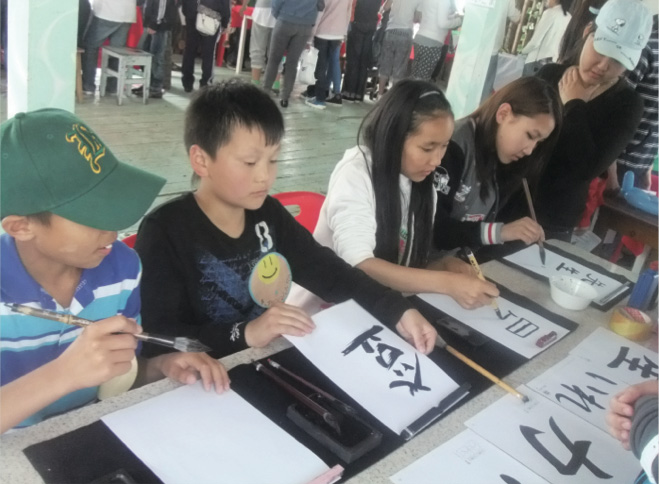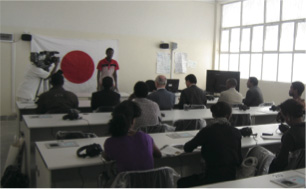Japan's Official Development Assistance White Paper 2012
(5) Cultural Preservation and Promotion
In developing countries, more people are interested in the promotion and preservation of their own cultures. For example, cultural heritages that symbolize a country are not only the source of pride for its people, but can also be used effectively as sightseeing resources to develop the society of the residents of surrounding areas. However, many of the cultural heritages of developing countries are at risk, and support to protect those cultural heritages can be viewed as cooperation that goes direct to people's hearts, and has long-term impacts. In addition, the preservation of the precious cultural heritages that are shared by all humankind is an issue that not only developing countries should be dealing with, but the entire international community as well.
<Japan's Efforts>
Since 1975 Japan has continued to contribute to the promotion of cultural and higher educational activities and preservation of cultural heritages of developing countries with Cultural Grant Assistance*. Specifically, Japan has implemented construction of the facilities for the preservation and use of the cultural heritages and cultural properties, sports and cultural facilities, higher education and research organization facilities, and improvement of necessary equipment in the said facilities. The equipment and facilities provided to developing countries through Cultural Grant Assistance are also used as bases for providing information of Japan, and for cultural exchange, and would deepen the understanding of Japan and fostering a sense of affinity towards Japan. In recent years, from the viewpoint of "Japan Promotion," Japan has also put importance on support for Japanese language education.
In FY 2011, Japan provided assistance for the educational, research and tourism facilities related to natural and cultural heritages in Mongolia, Laos, Peru, and Egypt. In addition to providing the opportunity for the people of these countries to become familiar with these heritages through the conservation, research and exhibition of their precious natural and cultural heritages, this assistance was intended to contribute to socio-economic development through the tourism industry.
Also, as part of its aim to develop human resources in developing countries, Japan has provided assistance for higher education in Japanese language, physical education, music, and a wide variety of others subjects in Cambodia, Sri Lanka, Dominican Republic, Panama, Brazil, Serbia, Bulgaria, Romania, and the Democratic Republic of the Congo. In addition to this, Japan has supported program production and broadcasting projects of radio and television stations in Columbia and Cuba.

Mongolian children learn penmanship under JOCV guidance. (Photo: Kumiko Kido)
Japan is supporting restoration and preservation of cultural heritage, providing equipment, and conducting the necessary preliminary studies and surveys on heritage through "the Japan Funds-in-Trust for the Preservation of the World Cultural Heritage" that has been established in UNESCO. Particular efforts are put in the capacity building of human resources in developing countries, through dispatching international experts, holding workshops, and other activities which serve to transfer techniques and knowledge as well. Japan provides support not only related to so-called tangible cultural heritages, but also for intangible cultural heritages such as traditional dance, music, handicraft technology, oral traditions, through "the Japan Funds-in-Trust for the Safeguarding of the Intangible Cultural Heritage" which has been established in UNESCO as well. Through the Funds, Japan supports projects for the training of successors, the storage of records, and other activities.
- *Cultural Grant Assistance
- Cultural Grant Assistance provides the funding to contribute to the promotion of cultural and higher educational activities and preservation of cultural heritage in developing countries. (procurement of equipment, construction of facilities, etc.) There are two types: "General Cultural Grant Assistance," which is provided to governmental organizations, and "Grant Assistance for Cultural Grassroots Projects," which is provided to NGOs and local public entities for small-scale projects.
●Ethiopia
Project to Supply Language Laboratory Equipment and Learning Materials to the Japanese Language Unit at Mekelle University
Grant Assistance for Cultural Grassroots Projects (GACGP) (November 2010 - November 2011)
Ethiopia's distinguished Mekelle University started offering Ethiopia's first Japanese language course in 2008. With interest in Japanese economy and technology on the rise, large numbers of students requested to enter the course. Without dedicated classrooms and equipment, however, few students were able to enroll, and the ones who did were faced with insufficient learning materials. With the help of the GACGP scheme, Japan responded to these problems by providing language labs and developing Japanese learning materials for the Japanese course. As a result of this assistance, three times as many students have been able to enroll in Japanese courses with better facilities and environment.
In March 2012, the Ethiopia's first Japanese speech contest was held under this Japanese course, and 20 student representatives offered impassioned speeches.
Japanese researchers have helped to preserve and research the cultural heritage of Ethiopia while introducing Japanese culture at Mekelle University. Assisting Japanese language education at Mekelle University is expected to contribute to human resource development in Ethiopia, increasing knowledge of Japanese culture and society, and promoting further exchange between the two countries.

Outstanding students give Japanese speeches in a well-equipped Japanese classroom. (Photo: Embassy of Japan in Ethiopia)
